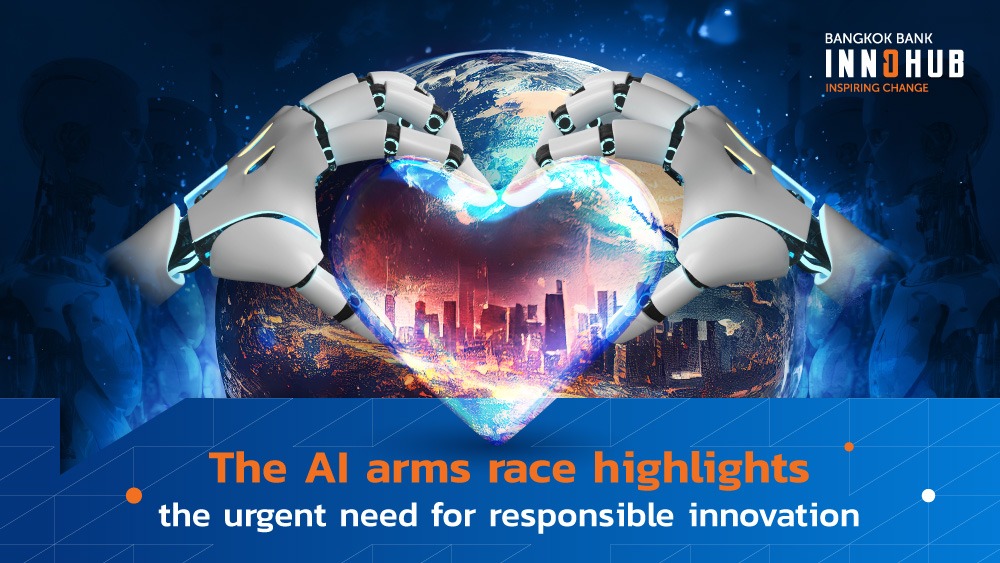Rules governing artificial intelligence are not new – legendary sci-fi author Isaac Asimov proposed his famous Three Laws of Robotics in 1942. His ideas were groundbreaking thinking at the time, but in the ensuing decades, as AI became probable, possible, and eventually inevitable, we have seen the need to have a much more nuanced look at AI development.
AI has made significant advancements in recent years, transforming the fields of medicine, finance, business, and industry. These advancements have been instrumental in what some consider the fourth Industrial Revolution — the move to smart and connected business ecosystems. As generative AI and large language models are increasingly embedded into productivity tools such as Google Bard and Microsoft Copilot, companies around the world are joining the race to develop their own AI-powered business solutions. However, these achievements also contribute to emerging risks that need to be addressed, such as profit-focused development, ethics washing, and value tensions.
To navigate these challenges, it is crucial to prioritize responsible AI practices. Companies should proactively consider the ethical implications and potential risks associated with AI development while upholding their commitment to fairness, interpretability, privacy, and safety in order to foster innovation while safeguarding individuals as well as society as a whole.
Responsible innovation vs. profit
When conducting research and developing new technologies, the first and most important step is to consider how the likely outcomes might affect society as a whole. The goal of this early evaluation is to make sure the positive social and economic benefits of research and innovation are fully realized while minimizing any negative side effects that could occur as a result of them being disseminated, adopted, or diffused. This is where responsible AI comes into play.
Responsible AI (RAI) refers to the design and deployment of AI systems that are transparent, unbiased, accountable, and guided by ethical principles. It encourages an ongoing dialogue between developers, policymakers, and the public to navigate the complex challenges and opportunities presented by AI, fostering a collective understanding of the societal implications and shaping AI’s trajectory towards a human-centric future.
A purely for-profit approach to AI development emphasizes maximizing financial gains and commercial success. While profitability is a legitimate goal for organizations, a sole focus on profit may overlook or downplay important ethical considerations and social impacts of AI technologies. Moreover, under a for-profit approach, companies tend to favor the rapid deployment of new applications, updates, or patches — a strategy which tends to result in more safety issues.
The distinction between responsible AI innovation and a for-profit approach lies in the underlying values and priorities driving AI development. Responsible innovation seeks to balance commercial interests with ethical considerations, ensuring that the benefits of AI are maximized while minimizing potential harm and societal risks. It aims to integrate ethical decision-making into every stage of AI development, from design and data collection to deployment and impact assessment. Ultimately, responsible innovation strives for a more sustainable, equitable, and socially beneficial integration of AI technologies into our lives.
Ethics washing
Ethics washing occurs when a business fakes or overstates its commitment to developing inclusive AI systems. Ethics washing, in the context of AI development, refers to the practice of organizations or individuals presenting a facade of ethical considerations and responsible practices without genuinely implementing them. It involves using ethical rhetoric, frameworks, or policies as a public relations strategy to enhance reputation or gain trust, even as the actual implementation falls short of the stated ethical principles. For instance, in 2019, Google announced a new AI ethics board to demonstrate the company’s commitment to ethical AI development. When observers found that its members lacked the power to veto questionable projects in which the company’s algorithms were accused of perpetuating racial and gender bias, a backlash ensued, resulting in the board’s disbandment.
Ethics washing also occurs when organizations merely pay lip service to ethical concerns without taking substantive action to address them. In practice, it tends to involve using vague or broad ethical statements without clear guidelines or concrete measures to ensure responsible AI development and deployment.
In today’s Information Age, audiences have learned to sniff out organizations that use ethical discourse as a marketing tool or public relations strategy while neglecting to address deeper ethical challenges or potential negative impacts associated with AI technologies. Each failure of AI oversight helps to draw even more attention to the importance of genuine ethical practices rather than superficial gestures or statements in the field of AI development.
Value tensions
In the context of ethical AI research and development, value tensions result from the inevitable trade-offs among competing values, principles, and objectives. These tensions emerge due to the complex ethical considerations, societal impacts, and diverse perspectives involved in designing, deploying, and using AI systems. Responsible AI development requires addressing these value tensions to strike a sensible balance between them, ensuring that AI systems align with ethical standards, human values, and the broader well-being of individuals and society.
The conflict between protecting users’ privacy and providing them with useful AI is one example of a value tension in ethically developing AI. To optimize performance and tailor user experiences, AI systems frequently rely on massive amounts of personal information. However, there is a tension between the desire for data-driven insights and the need to protect individuals’ privacy by maintaining data security. Resolving this tension involves implementing robust data protection measures, obtaining informed consent, and using privacy-preserving techniques to strike a balance between utility and privacy considerations.
The competing values of openness and intellectual property create yet another source of conflict. Responsible AI development requires transparency in the decision-making processes of AI systems to build trust, ensure accountability, and mitigate potential biases. In recent years, there has been a growing demand from both researchers and industry professionals for greater visibility into how AI models actually function. Transparency can aid in the resolution of issues such as fairness and discrimination, as demonstrated by examples such as Amazon’s AI tool for hiring, which was discovered to discriminate against women.
Lastly, organizations often consider their algorithms and models to be proprietary assets, which may limit the extent to which outsiders are allowed to understand the basis for the AI’s decision-making. For instance, courts may employ AI algorithms to assess the likelihood of defendants committing further crimes in the future. Decisions regarding bail, parole, and sentencing may likewise become more data-driven.
While such data-driven processes may lead to better outcomes in many cases, it is also possible for judges or governments to remain unaware of the inner workings of the algorithms on which they depend. Rather than openly sharing their methods, the companies that create these algorithms often choose to keep them hidden, putting the integrity of the judicial system at risk and preventing the kind of oversight that would be necessary to make sure the AI isn’t biased.
Principles for the responsible development of AI
Following a discussion of the inherent problems associated with for-profit development, ethics washing, and value tensions, we must now consider the framework within which AI should be developed. Here are a few principles that can be followed to ensure the well-being of society as a whole:
Fairness: Take a human-centered approach to assessing the system’s impact on users. Allow users to take charge of their experience by giving them access to relevant details and customizable settings. Furthermore, to ensure inclusivity, it’s important to think about and incorporate feedback from a wide range of users. This step helps to prevent biases and ensure equal opportunities for individuals, regardless of their backgrounds or characteristics.
Interpretability: Make AI systems transparent and interpretable by using multiple metrics to assess their training and performance. Consider user feedback, system performance, and other detailed metrics to understand how the system is working. Analyze false positives and false negatives across different user groups to evaluate fairness. Understand the raw data used to train the AI models, to identify any biases or limitations that might affect the system’s performance. By using multiple metrics and understanding the raw data, developers can identify and rectify biases or limitations, making the system more reliable and understandable to users.
Privacy: Respect user privacy when analyzing data, and examine the raw data directly to ensure its quality and accuracy. If sensitive data is involved, aggregate and anonymize it while still gaining valuable insights. Assess the representativeness of the training data to ensure the system performs well in real-world situations. Respecting privacy regulations and guidelines is essential for protecting sensitive information, preventing misuse, and maintaining the confidentiality of user data.
Safety: Test and monitor AI systems rigorously to ensure their safety. Use software engineering best practices for testing and detecting any potential issues. Monitor unexpected changes in input statistics to maintain reliability. Avoid training the system on the same data used for testing. Include users with diverse needs when testing, to create an inclusive and safe AI system. Rigorous testing, monitoring, and adherence to best practices reduce the risk of unintended failures, mitigate potential risks, and prioritize user safety.
In conclusion, the AI arms race underscores the urgent need for responsible innovation. In order for society as a whole to comprehend AI decision-making and cautiously incorporate it into our daily lives, we must prioritize ethical considerations, transparency, fairness, privacy, and safety. Furthermore, we must address ethics washing and value tensions in order to establish a fair middle ground for businesses, policymakers, and the general public. Commercial interests must be balanced with ethical considerations.
By adhering to these principles, developers can pave the way for a future where AI systems serve as powerful tools for societal progress. Embracing fairness ensures that AI technologies do not perpetuate or amplify existing biases, but instead become instruments for positive change by providing equal opportunities for all individuals.
The interpretability of AI systems grants users the ability to comprehend and trust the decisions made by these systems, fostering a sense of transparency and accountability. Respecting privacy safeguards the rights and autonomy of individuals, establishing a foundation of trust between users and AI technologies.




